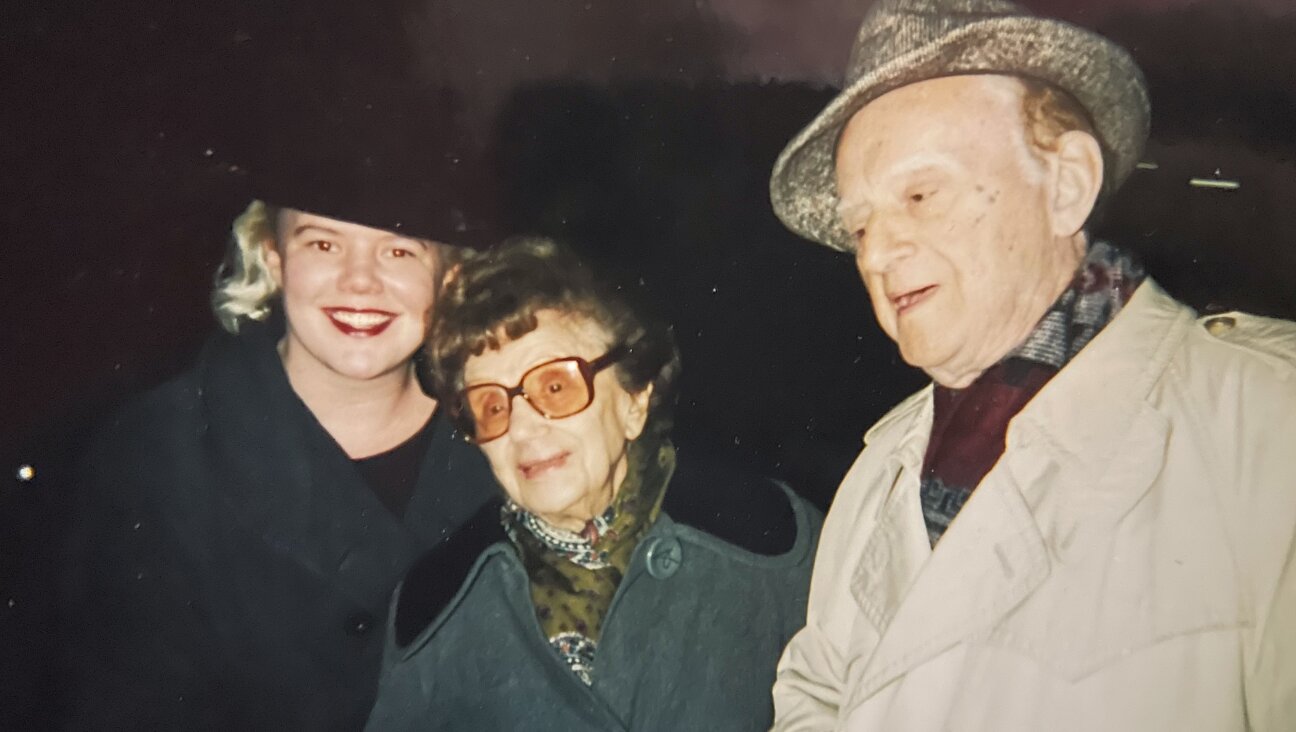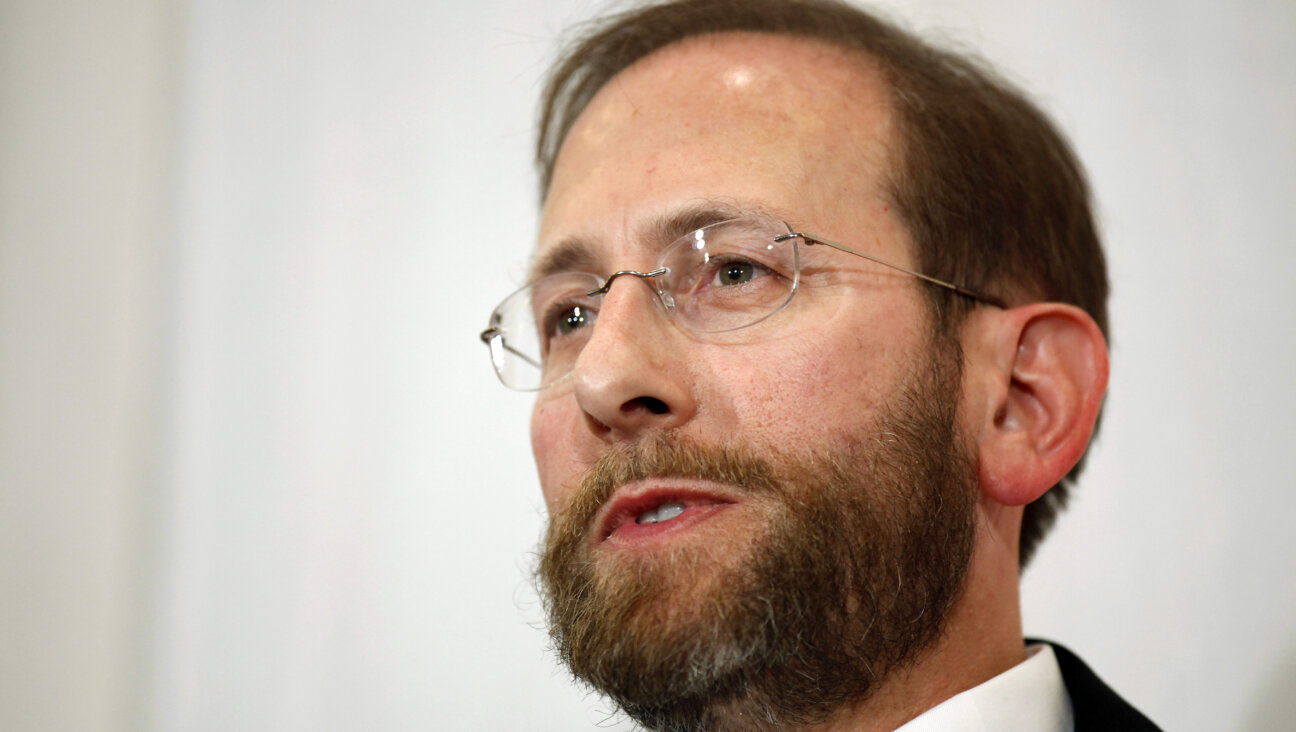Groups Hail Rehnquist, but Dershowitz Offers Dissent
WASHINGTON — Even as late chief justice William Rehnquist was being eulogized by several Jewish organizations, America’s most prominent Jewish lawyer, Alan Dershowitz, was accusing him of bigotry and discrimination.
Jewish groups praised Rehnquist, 80, who died September 3 after a highly publicized bout with cancer, as “the very model of a chief justice,” and as a “dedicated public servant.”
Dershowitz, however, told the Forward that Rehnquist’s actions out of court, as well as his opinions and rulings on the bench, formed “a pattern of bigotry, a pattern of discriminatory attitude.” Speaking of the late chief justice, Dershowitz said: “Any time he had a chance to decide a case involving civil rights, he generally tended to rule against African-Americans and in favor of whites, he tended to rule in favor of men and against women, he tended to rule in favor of the majority Christian religion and against Jews. There is a pattern, and the pattern is a terrible one.”
Dershowitz, the maverick Harvard Law professor and author of the 1991 best-selling book “Chutzpah,” a defense of Jewish assertiveness, sharply criticized Rehnquist, immediately after the chief justice’s death, first on Fox News and then in a scathing article in the Huffington Post, Arianna Huffington’s Web-based publication. When asked by the Forward why he chose to speak ill of a recently departed dignitary, Dershowitz said, “When he is the chief justice of the United States and he’s being replaced by some body who enormously admires him, I think that it is very much in the interest of the public for the whole story to be told.”
President Bush on Monday nominated Judge John Roberts, who once clerked for Rehnquist, to be the next chief justice.
Rehnquist’s story of bigotry, Dershowitz charged in an interview with the Forward, started in the early 1950s when Rehnquist was a law student at Stanford. Dershowitz said he heard from two reliable sources — one who was a Jewish student at Stanford at the time, and another classmate who was a friend of Rehnquist — that the future chief justice and several of his friends, on more than one occasion, would get dressed in brown shirts, go to the front of the dorm where the university’s few Jewish students lived and “would do the ‘Heil Hitler’ salute and they would goosestep.”
“They thought that was very funny,” Dershowitz said, adding that he was told by several people that Rehnquist had a reputation for “not liking Jews” and for telling antisemitic jokes.
Dershowitz’s allegations of discrimination were rejected by Herman Schwartz, a constitutional law expert at American University and critic of Rehnquist.
“I am not a fan of his. I will say very sharp things [about Rehnquist] too,” Schwartz told the Forward. But, he added, “I did not see a pattern of bigotry.”
“I don’t think you can make the case that he was an antisemite,” Schwartz said.
With regard to the alleged incident at Stanford, Schwartz said that he would be careful with “hearsay” regarding events 50 years ago. “I don’t know what was in his heart. He was opposed to everything that I believe in, but I have no basis to say such things,” Schwartz said. “I know Alan wrote a book called ‘Chutzpah,’ did he also write a book called paranoia?”
Dershowitz said that the alleged incident at Stanford was only “episode one.” He said that at one point, upon buying a home in Vermont, Rehnquist joined a restrictive covenant that barred sale of the property to “any member of the Hebrew race.”
In addition, Dershowitz pointed to a series of rulings, which he said constituted a pattern. For example, he said, in 1986, Rehnquist wrote the majority opinion that found an Orthodox rabbi in the Air Force could be denied the right to wear a yarmulke.
Schwartz, the American University professor, said that he would not attribute the yarmulke ruling to a dislike for Jews, but rather to Rehnquist’s routinely deferring to the military.
In his Huffington Post article, Dershowitz wrote that on the bench Rehnquist “generally opposed the rights of gays, women, blacks, aliens, and religious minorities. He was a friend of corporations, polluters, right wing Republicans, religious fundamentalists, homophobes, and other bigots.”
Dershowitz and other critics have noted that as a clerk for Justice Robert Jackson in 1952, Rehnquist recommended that his boss uphold segregation in Brown v. Board of Education. In the end, Jackson, who joined the other justices in outlawing racially segregated public schools, rejected the advice.
Dershowitz’s scolding remarks stood in stark contrast to the courteous compliments that Jewish organizations — including ones that disagreed with many of his rulings — showered on the former chief judge, calling him a loyal and efficient chief of the nation’s highest court.
The American Jewish Committee, in a press release, cited Rehnquist’s “strong and unrelenting commitment to the integrity and independence of the Supreme Court, and the overall federal judicial system.” Rabbi David Saperstein, who directs the Religious Action Center of Reform Judaism in Washington, said, “We salute Chief Justice Rehnquist for his service and his commitment to the Court and the country.” The Anti Defamation League issued a statement, declaring that “throughout his more than three decades on the Court, and his 19 years as chief justice, he was a dedicated public servant. Although we did not always agree with his rulings, we salute his commitment to the institution of the Court, to the federal judiciary, and to our nation.”
Officials at Jewish groups have privately expressed concern that Roberts will prove to be too conservative on several key issues. But, seemingly resigned to Roberts’s being confirmed, the organizations now intend to focus on President Bush’s next appointment to the Court, which many expect will be a more conservative jurist than Roberts.
Roberts’s confirmation by the Senate has been viewed widely in Washington as a virtual certainty since Bush tapped him in July to replace the retiring Sandra Day O’Connor. Only one major Jewish organization, the National Council of Jewish Women, has opposed him, and only one, the United Synagogue of Conservative Judaism, has endorsed him. Other groups have refused to weigh in on either side, but have publicly defended Roberts in the face of harsh criticism by liberal organizations seeking to paint him as a threat to religious minorities. Most Jewish groups simply sent letters to the Senate Judiciary Committee, proposing questions to ask the nominee.
Asked if Roberts’s being nominated to be chief justice would change their position, senior officials with major Jewish groups said that they would pay extra attention to his confirmation hearings, which are scheduled to begin September 12. However, they said, that will not change their decision to defer passing judgment on his being fit for the job until the end of the hearings.
Several officials with Jewish organizations said they expect groups to become more active when the president announces his next nominee to the Court, to replace O’Connor. Many expect that the new nominee will be more conservative than Roberts.
Dershowitz, who said he holds Roberts in high esteem as a “very qualified” jurist, maintained that Roberts would be appropriate as a counterbalance to a moderate. “If the president now were to appoint a moderate to the other seat, I would favor the package,” Dershowitz said. “But the public is entitled to know what the package is, and the president should put all his cards on the table now.”
The Forward is free to read, but it isn’t free to produce

I hope you appreciated this article. Before you go, I’d like to ask you to please support the Forward.
Now more than ever, American Jews need independent news they can trust, with reporting driven by truth, not ideology. We serve you, not any ideological agenda.
At a time when other newsrooms are closing or cutting back, the Forward has removed its paywall and invested additional resources to report on the ground from Israel and around the U.S. on the impact of the war, rising antisemitism and polarized discourse.
This is a great time to support independent Jewish journalism you rely on. Make a gift today!
— Rachel Fishman Feddersen, Publisher and CEO
Support our mission to tell the Jewish story fully and fairly.
Most Popular
- 1

News Student protesters being deported are not ‘martyrs and heroes,’ says former antisemitism envoy
- 2

News Who is Alan Garber, the Jewish Harvard president who stood up to Trump over antisemitism?
- 3

Opinion The dangerous Nazi legend behind Trump’s ruthless grab for power
- 4

Opinion What Jewish university presidents say: Trump is exploiting campus antisemitism, not fighting it
In Case You Missed It
-

Culture Will the next pope be good for the Jews?
-

Yiddish איבערזעצערין קאַרעד אָברײַען שרײַבט בוך וועגן די שטערן סימאָר רעכטצײַט און מרים קרעסיןTranslator Caraid O’Brien writing book on Yiddish stars Seymour Rechtseit and Miriam Kressyn
זי שטעלט אויך צונויף אַ פּאָדקאַסט מיטן בראָדװײ־אַקטיאָר האַל ראָבינסאָן אין דער ראָלע פֿון רעכטצײַט.
-

BINTEL BRIEF How do you deal with invitations from someone whose behavior drives you nuts?
-

Fast Forward An Israeli think tank used AI to analyze 4,400 American synagogue sermons. Here’s what it found.
-
Shop the Forward Store
100% of profits support our journalism
Republish This Story
Please read before republishing
We’re happy to make this story available to republish for free, unless it originated with JTA, Haaretz or another publication (as indicated on the article) and as long as you follow our guidelines.
You must comply with the following:
- Credit the Forward
- Retain our pixel
- Preserve our canonical link in Google search
- Add a noindex tag in Google search
See our full guidelines for more information, and this guide for detail about canonical URLs.
To republish, copy the HTML by clicking on the yellow button to the right; it includes our tracking pixel, all paragraph styles and hyperlinks, the author byline and credit to the Forward. It does not include images; to avoid copyright violations, you must add them manually, following our guidelines. Please email us at [email protected], subject line “republish,” with any questions or to let us know what stories you’re picking up.















